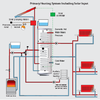Sure. Reasonably or not, I think of it as a fridge in reverse, with 'the outside world' corresponding to the cavity of the fridge.Some heat is moved from outside to inside, this adds to the heat generated by the heat pump to make the heat that heats the house.
... and I imagine that the same is true of a fridge?The issue with heat pumps is that they get less efficient at higher delta-T, this is why ground source is usually more efficient than air source and why a lower flow temperature is better than a higher one.
I would thing that 'depends', doesn't it?Well the heat pumped into the house by the heat pump is going to leak back out over time as will the heat from the electricity consumed by the heat pump, so the house as a whole will still be a net heat source.
If one temporarily forgets the (electrical) energy consumed, then the equilibrium situation resulting from the flow of heat into the house (as a result of the pump) and out of the house (by 'leakage') will (if the house benefits from any heating at all) surely be that the outside air temperature will be (very slightly!) lower than it would have been in the absence of a pump, wouldn't it? If so, when one puts the electrical power consumption of the pump back into the equation, does whether or not the house represents "a net heat source" depend upon whether or not that electrical energy exceeds the energy movement into the house (at equilibrium)?
If you're talking about the heat released by human bodies, then I wasn't even thinking about that, and you may well be right (and there's an awful lot of non-human animals{and plants}to also be considered).In any case my understanding is that direct releases of heat by humans are negligable in climate change terms, it's the indirect effects that make the big difference.
By my reckoning, with a fairly low estimate of average daily calorie intake of, say, 1000 kcal (~4.18 MJ) the great majority of which will end up as heat released into the environment, that would globally amount to something like 33 x 10^15 (33 quadrillion) Joules per day, which (if I've done my sums right!) is something like 1.2 billion kWh per day, for the entire human race, but I haven't got a clue as to how significant that is in climate change terms.
Kind Regards, John



